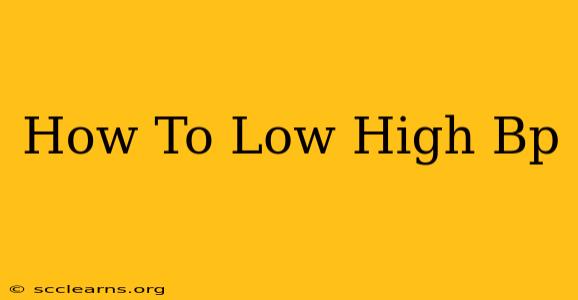High blood pressure (hypertension) is a serious health concern affecting millions worldwide. It significantly increases your risk of heart disease, stroke, and kidney failure. While medication is often necessary to manage hypertension, lifestyle changes can play a crucial role in lowering your blood pressure naturally and improving your overall health. This guide explores effective strategies to help you achieve and maintain healthy blood pressure levels.
Understanding High Blood Pressure
Before diving into solutions, let's briefly understand what high blood pressure is. Your blood pressure is the force of your blood pushing against the walls of your arteries. It's expressed as two numbers: systolic (top number) and diastolic (bottom number). High blood pressure is generally defined as a reading consistently above 140/90 mmHg. Several factors contribute to hypertension, including genetics, diet, lifestyle, and underlying health conditions.
Natural Ways to Lower High Blood Pressure
Fortunately, many natural approaches can help lower your blood pressure effectively. These strategies work best when implemented consistently as part of a holistic lifestyle change.
1. Dietary Changes: The Cornerstone of Blood Pressure Control
Your diet is arguably the most impactful factor in managing blood pressure. Here’s what to focus on:
- Reduce Sodium Intake: Sodium causes your body to retain water, increasing blood volume and pressure. Limit processed foods, fast food, and salty snacks. Opt for fresh, whole foods instead.
- Increase Potassium Intake: Potassium helps balance sodium levels and promotes healthy blood pressure. Good sources include bananas, spinach, sweet potatoes, and avocados.
- Eat More Fruits and Vegetables: Rich in essential vitamins, minerals, and antioxidants, fruits and vegetables support overall cardiovascular health. Aim for at least five servings daily.
- Embrace the DASH Diet: The Dietary Approaches to Stop Hypertension (DASH) diet emphasizes fruits, vegetables, whole grains, lean protein, and low-fat dairy. It’s highly effective in lowering blood pressure.
- Limit Saturated and Trans Fats: These unhealthy fats raise cholesterol levels, contributing to high blood pressure. Choose lean meats, poultry without skin, and avoid fried foods.
2. Lifestyle Modifications for Lasting Results
Beyond diet, several lifestyle adjustments can significantly impact your blood pressure:
- Regular Exercise: Aim for at least 150 minutes of moderate-intensity aerobic exercise per week. Activities like brisk walking, jogging, swimming, or cycling are excellent choices.
- Manage Stress: Chronic stress elevates blood pressure. Practice relaxation techniques like deep breathing, yoga, or meditation to manage stress effectively.
- Maintain a Healthy Weight: Losing even a modest amount of weight can substantially lower blood pressure, especially if you're overweight or obese.
- Limit Alcohol Consumption: Excessive alcohol intake elevates blood pressure. If you drink alcohol, do so in moderation.
- Quit Smoking: Smoking damages blood vessels and increases blood pressure. Quitting is one of the best things you can do for your cardiovascular health.
- Get Enough Sleep: Aim for 7-8 hours of quality sleep each night. Lack of sleep can negatively impact blood pressure.
3. Supplements to Consider (Consult Your Doctor First)
Certain supplements may offer additional support in lowering blood pressure. However, it's crucial to consult your doctor before taking any supplements, as they can interact with medications or have side effects. Some supplements often discussed include magnesium, CoQ10, and hibiscus.
When to Seek Professional Medical Advice
While these natural methods can be highly effective, it's crucial to remember that they are not a replacement for professional medical care. If you have high blood pressure, consult your doctor or healthcare provider. They can diagnose the underlying cause, monitor your progress, and recommend the most appropriate treatment plan, which may include medication in addition to lifestyle changes. Regular blood pressure checks are vital for effective management.
Conclusion: Taking Control of Your Blood Pressure
Lowering high blood pressure naturally is achievable through a combination of dietary changes, lifestyle modifications, and, in some cases, appropriate supplementation under medical supervision. By adopting these strategies, you can significantly reduce your risk of serious health complications and improve your quality of life. Remember, consistency is key. Making these changes a permanent part of your lifestyle will yield the best and most lasting results. Don't hesitate to seek professional guidance for personalized support and effective management of your blood pressure.

